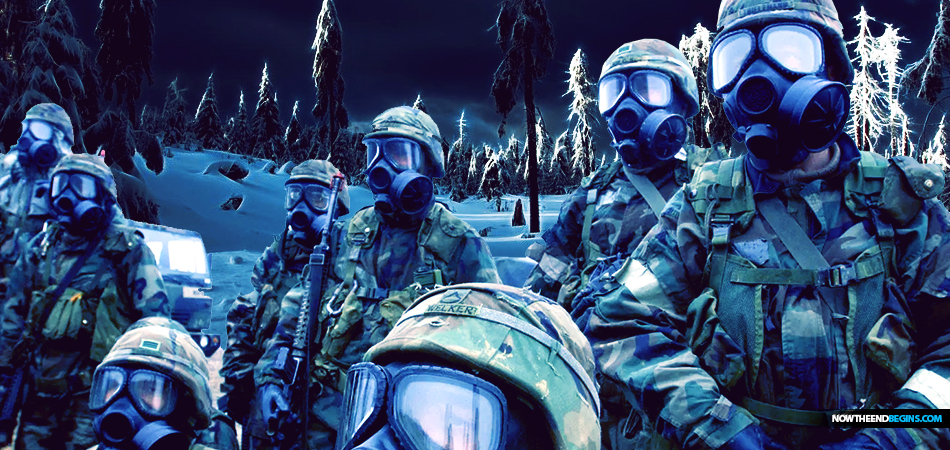
On June 22, 2001, a group of well-known U.S. officials and a handful of senior policymakers gathered at Andrews Air Force Base in Maryland for a senior-level exercise that simulated a biological weapons attack—an outbreak of deadly smallpox—on the United States. Dark Winter.
Now The End Begins was one of the very first media outlets anywhere in the world to show you the connection between Bill Gates, Event 201, Johns Hopkins and the COVID-1984 global plannedemic. Now here in the end on 2020, presumptive president-elect Joe Biden has been constantly repeating the phrase ‘dark winter’, an expression that upon further discovery brings you right back to Bill Gates and Event 201. Is this the next chapter in the COVID-1984 end times scenario?
These are the end times where there are no coincidences and things just don’t happen by accident. Take, for example, the Joe Biden campaign slogan of ‘Build Back Better’, a phrase that was crafted by the United Nations and the New World Order, long before Joe Biden started using it. So why did he start using it, and why is he now talking about a ‘dark winter’? I will tell you why. The global elites who brought you Event 201 and COVID-1984 and preparing you for the next step – forced vaccinations. Dark winter? You have no idea.
Forced lockdowns, mandatory vaccinations, human implantable Immunity Passports, and something that will send you out of the room running when you understand what it is – the ‘green zone shielding scenario’ that takes place inside your own home.
The lessons drawn from the 2001 Dark Winter exercise provided a stark preview of what the United States would face in 2020
FROM FOREIGN POLICY: Designed by the Johns Hopkins Center for Civilian Biodefense Strategies (now called the Center for Health Security) and the Washington-based Center for Strategic and International Studies (CSIS), the day-and-a-half-long “Dark Winter” simulation was conducted to gauge how senior leaders would respond to such an attack and included such high-level participants as Sen. Sam Nunn (who played the president), former White House advisor David Gergen (the national security advisor), and the retired career diplomat Frank Wisner (the secretary of state). But Dark Winter has since become legendary in senior policymaking circles in Washington for a different reason: It has regularly been cited by its designers and participants as the clearest exhibit of the spiraling stresses, and potential social collapse, that could be sparked by a public health crisis.
Dark Winter (which stipulates a smallpox attack by an unknown assailant) is not COVID-19 (a disease inadvertently spread by human contact), of course. But the fallout from the coronavirus pandemic bears an eerie resemblance to the simulation: leaders hampered by an inability to address a crisis they hadn’t foreseen (“We’d have been much more comfortable with a terrorist bombing,” Nunn later said in congressional testimony); national decision-making driven by data and expertise from the medical and public health sectors; management options limited by the swift and unpredictable spread of the disease (and a limited stockpile of vaccines); a health care system that lacks the surge capacity to deal with mass casualties; increased tensions between state and federal authorities; the rapid spread of misinformation on cures and treatments for the outbreak (the only way to treat smallpox is to not get it); the difficulty of controlling unpredicted flights of civilians from infected areas; domestic turmoil sparked by political uncertainty (with sporadic rioting—quelled by National Guard units—in large urban areas as grocery stores are shuttered); and an increasing reliance on the willingness (and unwillingness) of individual citizens to self-quarantine to stop the spread of the contagion.

JOE BIDEN’S CAMPAIGN ODD-SOUNDING CAMPAIGN SLOGAN ‘BUILD BACK BETTER’ WAS ACTUALLY TAKEN FROM UNITED NATIONS NEW WORLD ORDER AGENDA
The Dark Winter exercise ended on the second day of the simulation after three long sessions—and purposely without resolution. But then, the exercise’s goal was not to predict the future but to dramatize the issues faced by the federal government during a nationwide health crisis. In this it masterfully succeeded, showing that what begins as a localized disease outbreak (of smallpox appearing in Oklahoma City and then in two other densely populated urban areas) can quickly become a crisis that envelopes the entire nation and the world: State borders become chokepoints crowded with those fleeing the disease, Canada and Mexico close their borders with the United States, and foreign nations restrict the travel of American citizens. There is no worst-case scenario, with the collapse of American democracy, but democratic institutions are severely tested and strained. After Dark Winter was concluded, the participants drew clear lessons from the exercise, focusing on the federal government’s lack of preparation for a public health crisis.
The lessons drawn from the 2001 Dark Winter exercise provided a stark preview of what the United States would face in 2020: the unfamiliarity of governing officials with public health issues and the medical options available to address them; a likely lack of good information in the earliest moments of the crisis (Is the outbreak localized? How many Americans are infected? Where are they located? What health resources are available to treat them?); an unfamiliarity with the health care system and how medical care is actually delivered; the indecision surrounding the impact of quarantine orders (Should they be voluntary or required? Should they be local, statewide, or national? How should they be enforced?); the necessity of providing a medical surge capability that would alleviate the strain on hospitals and care providers (the U.S. military can build hospitals and quickly—as one participant noted—but who’s going to staff them?); and the need to act quickly and decisively to identify the threatening virus and, more crucially, to identify who is infected and who isn’t.
These lessons rippled out into the policymaking community, particularly after its participants and designers briefed key figures in the Bush administration and members of Congress on their findings. Included in the briefing was a series of grimly realistic videotapes of the exercise that dramatized its likely effects. “It is not pleasant,” CSIS’s John Hamre told members of Congress in introducing the videos. One of those who agreed, according to retired Air Force Col. Randall Larsen (who co-designed the simulation for CSIS), was Vice President Dick Cheney, who sat through the presentation (just nine days after 9/11) in his office at the Eisenhower Executive Office Building before offering his own judgment. “This is terrifying,” he said.
“Dark Winter was an exercise designed to push the system to failure in order to learn about its vulnerabilities,” said Andrew Lakoff, a professor of sociology at the University of Southern California who has studied Dark Winter and its impact. “The lessons of Dark Winter shaped biological preparedness policy for the next 10 years, but it is always difficult to ensure that preparedness is sustained over time.”
Trained as a sociologist and anthropologist of science in medicine, Lakoff is the author of Unprepared: Global Health in a Time of Emergency, an account of global and national responses to disease outbreaks from the SARS epidemic through the spread of the Ebola virus. So it is no surprise that Lakoff has been following the national response to the coronavirus pandemic closely—and worrying that the crisis portrayed by Dark Winter is being replayed now, in what is clearly not a simulation. READ MORE
No comments:
Post a Comment